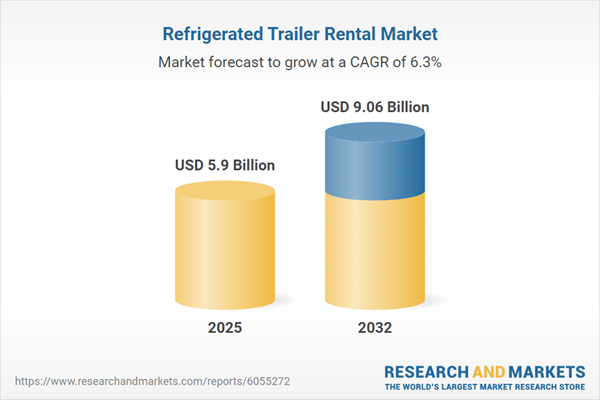Speak directly to the analyst to clarify any post sales queries you may have.
The refrigerated trailer rental market is experiencing rapid evolution in response to dynamic supply chain requirements, regulatory shifts, and technological advancements. This report provides strategic analysis tailored for senior decision-makers seeking actionable insights for resilient, flexible cold chain solutions.
Market Snapshot: Refrigerated Trailer Rental Market Growth and Trends
The refrigerated trailer rental market grew from USD 5.56 billion in 2024 to USD 5.90 billion in 2025. It is projected to continue expanding at a CAGR of 6.29%, reaching USD 9.06 billion by 2032. Market growth is underpinned by rising demand for perishable goods transportation, stringent food safety regulations, and a growing emphasis on sustainability across cold chain logistics.
Scope & Segmentation of the Refrigerated Trailer Rental Market
This comprehensive report analyzes the refrigerated trailer rental market across several key dimensions, offering clarity on where growth opportunities and operational challenges reside:
- Trailer Types: Multi-Temperature Refrigerated Trailer, Single-Temperature Refrigerated Trailer
- Trailer Sizes: 6'x10′, 6'x12′, 6'x16′, 7'x20', 8'5”x20'
- Rental Duration Models: Long-Term Rental, Short-Term Rental
- End-User Industries:
- Chemicals
- Food & Beverage (Dairy Products, Fruits & Vegetables)
- Pharmaceuticals & Healthcare
- Transportation & Logistics
- Regional Coverage:
- Americas: North America (United States, Canada, Mexico), Latin America (Brazil, Argentina, Chile, Colombia, Peru)
- Europe, Middle East & Africa: Europe (United Kingdom, Germany, France, Russia, Italy, Spain, Netherlands, Sweden, Poland, Switzerland), Middle East (United Arab Emirates, Saudi Arabia, Qatar, Turkey, Israel), Africa (South Africa, Nigeria, Egypt, Kenya)
- Asia-Pacific: China, India, Japan, Australia, South Korea, Indonesia, Thailand, Malaysia, Singapore, Taiwan
- Leading Companies Assessed:
- Anhui Kaile Special Vehicle Co., Ltd.
- Boxwheel Trailer Leasing LLC
- Curt's Coolers, Inc.
- Great Dane LLC
- Hale Trailer Brake and Wheel, Inc.
- Jilco Equipment Leasing Co. Inc.
- Keep It Cold
- Mckinney Trailer Rentals
- Penske Truck Leasing Co., L.P.
- PETIT FORESTIER UK LIMITED
- PLM Fleet, LLC
- Polar Leasing, Inc.
- Premier Trailers, LLC
- RTR Rentals, Inc.
- Ryder Systems, Inc.
- Schmitz Cargobull AG
- Sonsray Rental and Leasing, Inc.
- Storage In Motion
- Sunbelt Rentals, Inc.
- The Larson Group
- Thermo King
- TIP Group
- Transport Refrigeration, Inc.
- Wabash National Corporation
- XPO Logistics
Key Takeaways for Senior Decision-Makers
- Technological integration—including IoT, real-time monitoring, and predictive maintenance—optimizes fleet performance, reduces downtime, and supports advanced compliance requirements.
- Environmental mandates are catalyzing the use of low global warming potential refrigerants and energy-efficient insulation, impacting both fleet upgrade strategies and client procurement decisions.
- Flexible rental models provide scalable capacity and mitigate long-term capital commitments, offering businesses agility during demand fluctuations and peak seasons.
- Service providers are differentiating through value-added solutions such as integrated cleaning services, supply chain analytics, and enhanced regulatory compliance support.
- Collaboration with telematics and logistics partners enables a shift from traditional leasing to holistic logistics partnerships focused on transparency and operational resilience.
- Innovative trailer designs and modular temperature configurations support diverse sector needs, from pharmaceutical precision to food and beverage versatility, reinforcing customer-centric differentiation in a competitive market.
Tariff Impact on Refrigerated Trailer Rental Operations
The introduction of new U.S. tariffs in early 2025 has increased costs for critical components like chassis materials and refrigeration units. Rental operators have responded by reassessing supply chain strategies, engaging in nearshoring, and renegotiating supplier contracts to stabilize costs and ensure asset availability. These measures emphasize the need for adaptable procurement frameworks and proactive asset lifecycle management.
Methodology & Data Sources
This research combines extensive desk analysis of regulatory publications, market studies, and industry reports, with primary interviews of logistics managers, equipment manufacturers, and rental providers. Findings are validated through cross-referencing multiple data points and peer reviews, delivering an accurate, real-world view of market dynamics and emerging trends.
Why This Report Matters for Strategic Leadership
- Gain deep understanding of regulatory environments, technological innovations, and operational best practices shaping the refrigerated trailer rental ecosystem.
- Benchmark against competitors and identify white space opportunities in key regional markets and industry verticals.
- Leverage proven insights on scalable fleet management, sustainability compliance, and customer-driven service development for informed decision-making.
Conclusion
Senior leaders will find practical guidance in this report to navigate the evolving landscape, enhance operational efficiencies, and foster lasting customer partnerships. Proactive adaptation and collaborative innovation remain central to achieving future-ready cold chain solutions.
Table of Contents
3. Executive Summary
4. Market Overview
7. Cumulative Impact of Artificial Intelligence 2025
Companies Mentioned
The companies profiled in this Refrigerated Trailer Rental market report include:- Anhui Kaile Special Vehicle Co., Ltd.
- Boxwheel Trailer Leasing LLC
- Curt's Coolers, Inc.
- Great Dane LLC
- Hale Trailer Brake and Wheel, Inc.
- Jilco Equipment Leasing Co. Inc.
- Keep It Cold
- Mckinney Trailer Rentals
- Penske Truck Leasing Co., L.P.
- PETIT FORESTIER UK LIMITED
- PLM Fleet, LLC
- Polar Leasing, Inc.
- Premier Trailers, LLC
- RTR Rentals, Inc.
- Ryder Systems, Inc.
- Schmitz Cargobull AG
- Sonsray Rental and Leasing, Inc.
- Storage In Motion
- Sunbelt Rentals, Inc.
- The Larson Group
- Thermo King
- TIP Group
- Transport Refrigeration, Inc.
- Wabash National Corporation
- XPO Logistics
Table Information
| Report Attribute | Details |
|---|---|
| No. of Pages | 187 |
| Published | November 2025 |
| Forecast Period | 2025 - 2032 |
| Estimated Market Value ( USD | $ 5.9 Billion |
| Forecasted Market Value ( USD | $ 9.06 Billion |
| Compound Annual Growth Rate | 6.2% |
| Regions Covered | Global |
| No. of Companies Mentioned | 26 |









